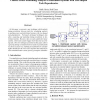Free Online Productivity Tools
i2Speak
i2Symbol
i2OCR
iTex2Img
iWeb2Print
iWeb2Shot
i2Type
iPdf2Split
iPdf2Merge
i2Bopomofo
i2Arabic
i2Style
i2Image
i2PDF
iLatex2Rtf
Sci2ools
126
click to vote
DATE
2005
IEEE
2005
IEEE
Context-Aware Scheduling Analysis of Distributed Systems with Tree-Shaped Task-Dependencies
In this paper we present a new technique which exploits timing-correlation between tasks for scheduling analysis in multiprocessor and distributed systems with tree-shaped task-dependencies. Previously developed techniques also allow capturing and exploiting timing-correlation in distributed systems. However, they are only suitable for linear systems, where tasks cannot trigger more than one succeeding task. The new technique presented in this paper, allows capturing timing-correlation between tasks in parallel paths in a more accurate way, enabling its exploitation to calculate tighter bounds for the worst-case response time analysis for tasks scheduled under a static priority preemptive scheduler.
DATE 2005 | Distributed Systems | Hardware | Priority Preemptive Scheduler | Worst-case Response Time |
| Added | 24 Jun 2010 |
| Updated | 24 Jun 2010 |
| Type | Conference |
| Year | 2005 |
| Where | DATE |
| Authors | Rafik Henia, Rolf Ernst |
Comments (0)

